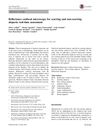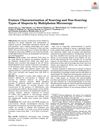In Vivo Reflectance Confocal Microscopy in General Dermatology: How to Choose the Right Indication
April 2020
in “
Dermatology practical & conceptual
”

TLDR Reflectance confocal microscopy is useful for diagnosing and monitoring skin diseases, but it has limitations and requires expertise for correct use.
The 2020 document discussed the use of in vivo reflectance confocal microscopy (RCM) in dermatology. RCM, a non-invasive imaging technique, was found to be useful in diagnosing and monitoring skin diseases such as melanoma, basal cell carcinoma, and inflammatory skin diseases. It was also effective in distinguishing between scarring alopecia (SA) and nonscarring alopecia (NSA). However, the technique had limitations, such as difficulty in evaluating hyperkeratotic and ulcerated lesions, and required significant expertise for correct image interpretation. The choice of RCM device and its use could be influenced by factors like the presence of ulceration or hyperkeratosis and the anatomical site of the lesion.





